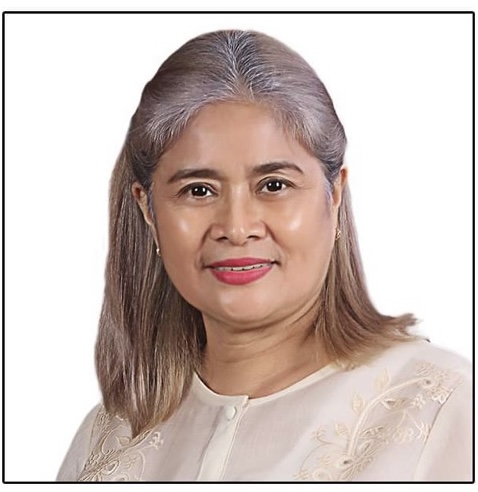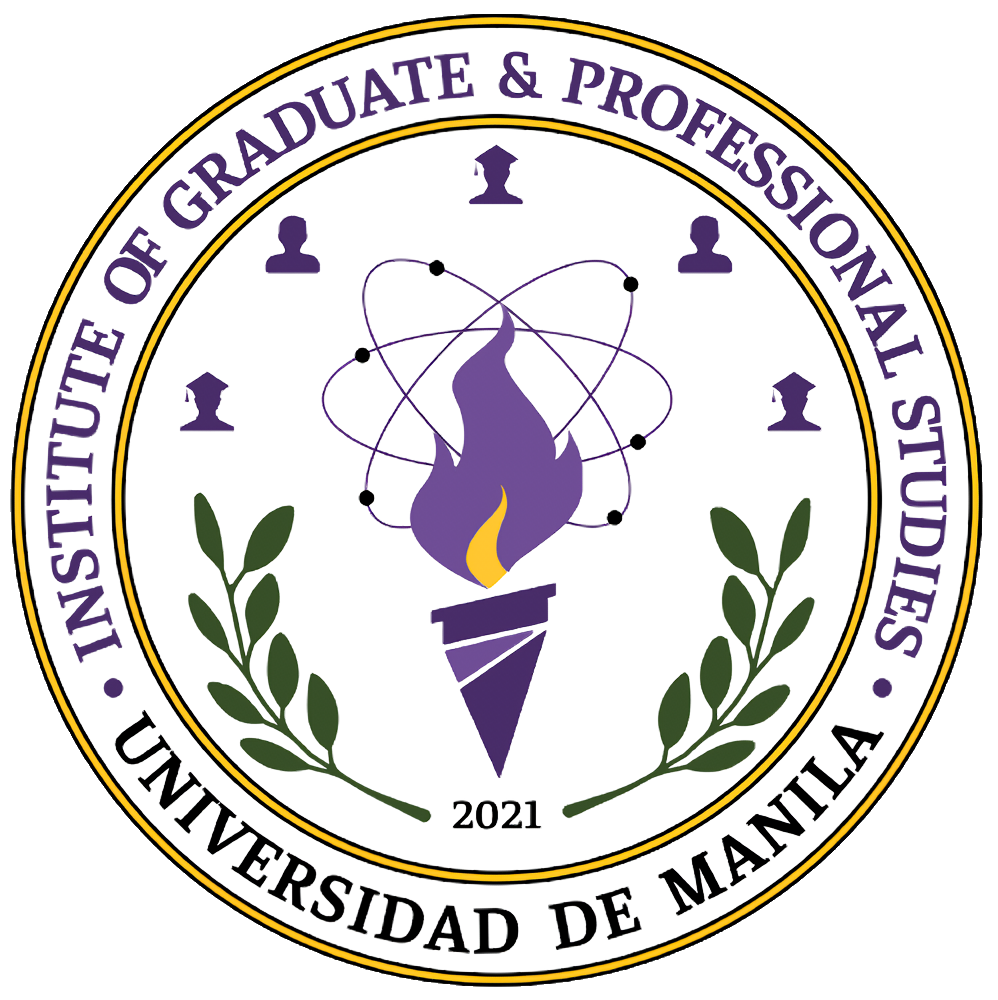College Overview
The Institute of Graduate & Professional Studies (IGPS) is UDM’s academic unit for its various advanced program of studies headed by the Dean and assisted by its various program chairs and the Academic and Office Coordinator.

Dr. Leila R. Gano
Institute of Graduate and Professional Studies
Mission
As a premier institution, the UDM Institute of Graduate and Professional Studies (IGPS) is dedicated to advancing the frontiers of knowledge through quality graduate programs that are relevant, pragmatic and responsive to the formations of scholars and high level professionals who are ethical, compassionate and committed to the service of the City of Manila the nation, and the global community.
Vision
The Universidad de Manila (UDM) Institute of Graduate and Professional Studies (IGPS) shall be the center of excellence of advanced studies that aspire to produce graduates imbued with high degree of professionalisms, ethical standard and global competitiveness of its programs and quality of research.

IGPS Logo
The logo of the UDM Institute of Graduate and Professional Studies (IGPS) shows the torch at the center, a kindled flame, depicting the ignited mind of a graduate and professional student’s curiosity for advanced studies.
The official color of the Institute of Graduate and Professional Studies (IGPS) are Purple together with the University’s green and yellow.
Read MoreThe color purple represents high value and lofty goals which signify the Institute’s role to provide and support students’ desire for continuing education.
The people logo depicts varied students who aspire to enroll in the five graduate and professional degree programs in the Institute.
The atom circling the purple on yellow flame symbolizes the science that guides the kindled mind, either in the advanced research-based degree (graduate studies) or developing skills and knowledge for a specific profession (professional studies), towards the goal of achieving the degree program.
The wreath of green Nilad leaves encircling the seal symbolizes achievement and success in keeping up with fast pace knowledge, is delivered in the technology-driven flexible mode andragogy.
In line with the University’s over-aching mission and vision, the Institute of Graduate and Professional Studies (IGPS) offers the following academic degree programs:
PROGRAMS
The Doctor of Philosophy in Education (PhDEd) is a graduate program leading to the degree that focuses on research and prepares students for a life of scholarship in an academic discipline. the Board Resolution No. 31 series 2014 approved the offering of the curriculum in Doctor of Philosophy (PhD) major in Educational leadership and Management as March 21, 2014.
In compliance to CMO No. 15 series 2019, the Doctor of Philosophy in Education (PhDEd) major in Educational Leadership and Management was approved by the Board of Regents starting school year 2022-2023 through Board Resolution No. 101 series 2022. Its goal is to generate dynamic leaders with in-depth knowledge and expertise in leadership and management study and research in order to address the complex challenges that face districts, colleges, and universities, foundations and government agencies.
The program has thirty-three (33) units of coursework and twelve units of dissertation. As per the CMO No. 15, to wit:
“Furthermore, students are required to pass a comprehensive examination. There shall be a public defense of the dissertation. The HEI announces that schedule of the defense through posting in the HEI website/social media or sending email to its academic community. As a final output, the student must also have publication, specifically, evidence of acceptance to an internationally or nationally referred and indexed journal or have a juried creative work outlet.”
The Master of Science in Criminal Justice (MSCJ) with specialization in Criminology is a degree program designed for students pursuing a career in academia, and careers in applied research and analysis with criminal justice agencies and organizations. The curriculum is mainly centered on law, the legal system, legal processes, and legal research. It was approved by the Board of Regents to be offered starting the school year 2022-2023 through Board Resolution No. 101 series 2022. The MSCJ has two (2) Tracks: Academic Track (with Thesis) and Professional Track (Non-Thesis).
The MSCJ Academic Track (with Thesis) has thirty (30) units of coursework and six(6) units of thesis. It requires the students to pass a comprehensive examination. As a final output, the students must have at least one (1) publication in referred journal or juried creative work complied within the academic year of graduation and onwards.
The MSCJ Professional Track (Non-Thesis) has thirty (30) units of coursework and three (3) units of capstone practice-based. It requires the students to pass a comprehensive examination. As a final output, the students must complete a capstone project.
The Doctor in Public Administration (DPA), as a Professional Track degree, is a mastery of the subject matter and techniques of a professional field to a stage of competence parallel to that required for the PhD. Students admitted to the program shall be prepared to train or supervise others in the government service, in the voluntary and private sector and those prospective faculty and academic leaders. The program provides a strong theoretical foundation in public administration combined with the practice of good public governance, ethical leadership, and public accountability. The Board Resolution No. 92 series 2022 established the offering of the DPA degree program.
The students of DPA are required to pass a comprehensive examination. The program has thirty-three (33) units of coursework and twelve units of practice-based research dissertation presented in a public defense.
By virtue of Board Resolution No. 30 series 2008, the Board of Regents has approved the Master of Arts in Education (MAEd) Major in Education Management as the initial graduate program offered for its maiden opening for School Year 2009-2010. In 2014, Board Resolution No. 29 series 2014 reiterated the offering of Master of Arts in Education Major in Educational Administration.
However, to be responsive to the demands of the teaching profession and in compliance to the set Policies, Standards, and Guidelines for Graduate Programs (CMO No. 15), the Master of Arts in Education major in Educational Leadership and Management was established and offered in school 2022-2023 via Board Resolution No. 10 series 2022. The MAEd has two (2) Tracks: Academic Track (with Thesis) and Professional Track (Non-Thesis).
The Master of Arts in Education (MAEd) Academic Track (with Thesis) major in Educational Leadership and Management is a graduate academic degree program consisting of advance studies in an academic discipline with the primary purpose of contributing to the generation, production, and advancement of knowledge. It has thirty (30) units of coursework and six (6) units of thesis. It requires the students to pass a comprehensive examination. As a final output, the students must have at least one (1) publication in referred journal or juried creative work complied within the academic year of graduation and onwards.
The Master of Arts in Education (MAEd) Professional Track (Non-Thesis) major in Educational Leadership and Management has thirty (30) units of coursework and three (3) units of capstone practice-based project. It requires the students to pass a comprehensive examination. As a final output, the students must complete a capstone project.
MBA Program is a general degree program that aims to develop managerial and leadership potential of professionals whether they are in industrial, financial, government or non-profit institutions. To gain a distinct advantage in their profession, the program is complemented by case analyses, policy studies, business plan and other experiential learning methods.
The Board Resolution No. 101 series 2022 established the offering of the Master of Business Administration (MBA). The MBA has two (2) Tracks: Academic Track (with Thesis) and Professional Track (Non-Thesis).
The Master in Business Administration (MBA) Academic Track (with Thesis) has thirty (30) units of coursework and six (6) units of thesis. It requires the students to pass a comprehensive examination. As a final output, the students must have at least one (1) publication in refereed journal or juried creative work complied within the academic year of graduation and onwards.
The Master in Business Administration (MBA) Professional Track (Non Thesis) has thirty (30) units of coursework and three (3) units of capstone practice-based. It requires the students to pass a comprehensive examination. As a final output, the students must complete a capstone project.
The Master of Public Administration (MPA) degree is a degree designed for those who aspires for management positions in the public sector or in non-for-profit agencies. It is designed to equip students with administrative and management concepts and theories to enhance the student’s management and research capability in the field of government, budgeting, financial resource management, human resource development and contemporary issues in public affairs management.
The Board Resolution No. 92 series 2022 established the offering of the Master of Public Administration (MPA). The MPA has two (2) Tracks: Academic Track (with Thesis) and Professional Track (Non-Thesis).
The MPA Academic Track (with Thesis) has thirty (30) units of coursework and six (6) units of a thesis. It requires the students to pass a comprehensive examination. As a final output, the students must have at least one (1) publication in a refereed journal or juried creative work complied within the academic year of graduation and onwards.
The MPA Professional Track (Non-Thesis) has thirty (30) units of coursework and three (3) units of capstone practice-based. It requires the students to pass a comprehensive examination. As a final output, the students must complete a capstone project.
The Master of Science in Criminal Justice (MSCJ) with specialization in Criminology is a degree program designed for students pursuing a career in academia, and careers in applied research and analysis with criminal justice agencies and organizations. The curriculum is mainly centered on law, the legal system, legal processes, and legal research. It was approved by the Board of Regents to be offered starting school year 2022-2023 through Board Resolution No. 101 series 2022. The MSCJ has two (2) Tracks: Academic Track (with Thesis) and Professional Track (Non-Thesis)
The MSCJ Academic Track (with Thesis) has thirty (30) units of coursework and six (6) units of thesis. It requires the students to pass a comprehensive examination. As a final output, the students must have at least one (1) publication in refereed journal or juried creative work complied within the academic year of graduation and onwards.
The MSCJ Professional Track (Non-Thesis) has thirty (30) units of coursework and three (3) units of capstone practice-based. It required the students to pass a comprehensive examination. As a final output, the students must complete a capstone project.
The IGPS follows a 14-week trimester calendar beginning every August of each school year. Classes are held on schedules with one (1) weekday and one (1) weekend pairing as follows:
| Schedule of Classes | Trimester Schedule |
|---|---|
| Saturdays | First Semester : August – October |
| Weekdays (Wednesday/ Thursday) | Second Semester : November – February |
| Third Semester : March – June |
| Course Code | Course Title |
|---|---|
| ABG 01 | Introduction to Barangay Governance |
| ABG 02 | Barangay Development Planning, Implementation, and Monitoring |
| ABG 03 | Barangay Fiscal Administration (Accounting, Budgeting, Procurement and Disposal) |
| ABG 04 | Local Legislation |
| ABG 05 | Development of Applied Skills |
| ABG 06 | Barangay Informatics – Digital Administration and Management |
| ABG 07 | Barangay and the Philippine Criminal Justice System |
Academic Calendar
| Duration | Four (4) Months / 16 Weeks |
| Total Number of Contact Hours | 192 Hours |
| Schedule of Classes | Saturdays and Sundays 9:00AM to 12:00PM 1:00PM to 4:00PM |
ADMISSION POLICY
1. General
| Duration | Four (4) Months / 16 Weeks |
| Total Number of Contact Hours | 192 Hours |
| Schedule of Classes | Saturdays and Sundays 9:00AM to 12:00PM 1:00PM to 4:00PM |
Ms. Laarni, Marketing Officer
lmhernandez@udm.edu.ph
Mobile: 09760735153


